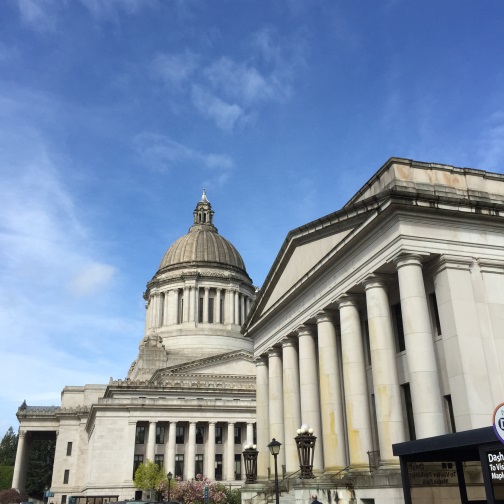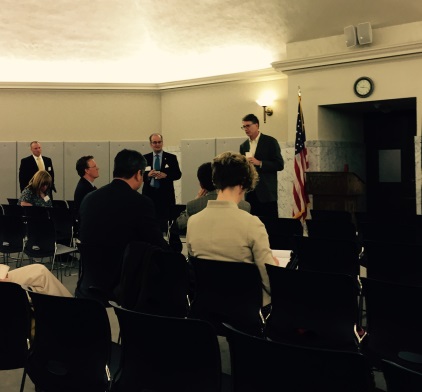 CleanTech Alliance assembled nearly 30 constituents to take part in the first CleanTech Day in Olympia on April 6. The delegation briefed more than 20 Senators and Representatives on the importance of advancing the Clean Energy Fund extension as part of the capital budget.
CleanTech Alliance assembled nearly 30 constituents to take part in the first CleanTech Day in Olympia on April 6. The delegation briefed more than 20 Senators and Representatives on the importance of advancing the Clean Energy Fund extension as part of the capital budget.
Governor Jay Inslee proposed a $60 million Clean Energy Fund extension to spur further innovation, economic development and job growth within Washington’s cleantech sector – an industry that employs an estimated 90,000 workers across the state. The House presented a $40 million Clean Energy Fund extension as part of its 2015 capital budget, which was not supported in the Senate budget proposal. Negotiations are now underway.
In 2013, the Legislature approved a $40 million Clean Energy Fund to spur clean energy innovation, advance our economy and create jobs. The results are threefold:
-
Smart Grid Grants: Washington businesses leveraged grants to work with utilities and research institutions to improve energy reliability for our citizens and reduce the cost of renewable energy deployment across the state.
-
Avista was awarded $3.2 million to test a utility-scale battery in Pullman developed by Mukilteo’s UniEnergy Technologies.
-
Puget Sound Energy was awarded $3.8 million to deploy a utility-scale battery in Glacier.
-
 Snohomish PUD was awarded $7.3 million for two demonstration projects, working with Seattle’s 1Energy Systems to implement industry standards for energy storage.
Snohomish PUD was awarded $7.3 million for two demonstration projects, working with Seattle’s 1Energy Systems to implement industry standards for energy storage. -
Schweitzer Engineering, Pacific Northwest National Laboratory, Washington State University and the University of Washington all took part in these projects. As a result, Washington energy storage technology is now being recognized and replicated worldwide.
-
-
Energy Revolving Loan Fund Grants: More than 800 energy retrofit and renewable energy projects were made possible by revolving loan fund grants. More than 700 homeowners statewide have leveraged the Clean Energy Fund to improve the energy efficiency of their homes. These projects have created more than 25,000 job hours for the state. Project numbers are increasing by the day, engaging small businesses and service providers while creating technical jobs that build a stronger middle class.
-
Federal Matching Grants: Washington universities and research institutions are more competitive as a result of the Clean Energy Fund. Five projects were awarded $4.98 million to help secure federal funding to make Washington research institutions more competitive. To date, close to $1 million in federal funding has been attracted due to the Clean Energy Fund.
Interested in supporting the Clean Energy Fund? Contact your legislators by April 24 and make a difference.